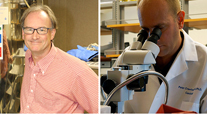We’re excited to announce that we have recruited two cardiometabolic experts to our Medical City campus in Lake Nona (Orlando), Fla. Peter A. Crawford, MD, PhD, and Andre d’Avignon, PhD, join our Cardiovascular Pathobiology Program from Washington University in St. Louis, Mo. The increasing density of local scientists and clinicians in Orlando is accelerating the growth of the region’s bio-medical industry, promoting both economic development and the quality of health care.
“Bringing renowned cardiometabolic scientists to Sanford-Burnham is an extraordinary achievement,” said Dwight Towler, MD, PhD, professor and director of the Cardiovascular Pathobiology Program. “These recruits illustrate the attractiveness of Orlando’s life-science cluster to top medical professionals from across the country. Their arrival catalyzes cardiac research, health services, and training programs at Medical City.”
A cardiometabolic power couple
In addition to Sanford-Burnham’s recruits, a third cardiac expert, Jane Chen, MD, Crawford’s spouse, will join the Orlando VA Medical Center as a clinical cardiac-arrhythmia specialist. Chen is a nationally recognized leader in the training of future physicians in her field.
“We are excited to have Dr. Chen join the Orlando VA Medical Center team,” said Kenneth Goldberg, MD, chief of staff for the Orlando VA Medical Center. “As we open the new hospital, we will continue adding outstanding physicians who will provide the highest-quality care to our veterans. The intersection of research, education, and health care in Medical City, reinforced by the strong partnerships between organizations, makes it a unique working environment.”
Studying the flow of fuel out of the liver and into heart cells
Crawford, a cardiologist and NIH-funded expert in the metabolic sciences, will serve as associate professor and associate director of the Cardiovascular Pathobiology Program. Crawford will study how fuel metabolism can be modified in situations of cardiometabolic stress, such as over-nutrition, heart failure, shock, or sepsis, among others. In particular, he and his team are interested in ketones – carbon-containing organic compounds that are produced in the liver and are a fuel source of the heart – and how modifying the flow of ketones out of the liver and into heart cells could improve adverse consequences of obesity and diabetes on heart function. This work shows promise to discover new treatments for heart failure. In addition, his expertise in fluxomics, a technology that analyzes the flow of fuel molecules such as glucose, fat, and ketones into and out of cells, will form the basis for advanced personalized medicine and, potentially, techniques to minimize cardiac damage during insults such as a heart attack and high blood pressure.
Finding biomarkers to inform treatment decisions
Faculty-level recruitment translates into additional hires as senior scientists employ staff researchers and specialists in their labs. One such expert is newly recruited d’Avignon, who was previously director of the high-resolution nuclear-magnetic resonance (NMR) facility in the Department of Chemistry at Washington University. As a member of Crawford’s research team, his expertise in NMR will be applied to the real-time characterization of fuel metabolism in cells and tissues. The ultimate goal of his research is to develop biomarkers that will inform treatment decisions and enable clinicians to determine early on whether cardiometabolic patients will respond to a certain medicine.
“These important new recruits have specialized expertise that will accelerate our research into subclasses of cardiometabolic disease. Their discoveries will contribute to the development of personalized approaches to treating various types of heart disease, and, in particular, hold promise for diabetics who have a unique form of the disease,” said Towler. “I look forward to working closely with our new Program members to advance the understanding of cardiometabolic diseases and how we can translate this knowledge into novel treatments.”
